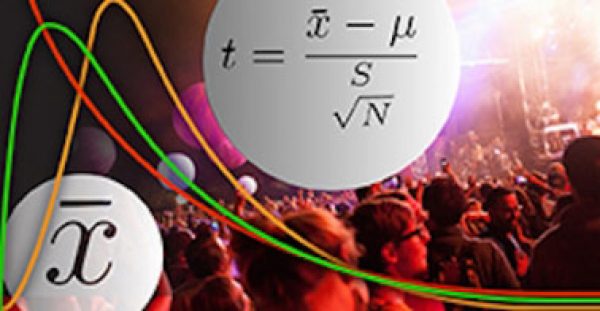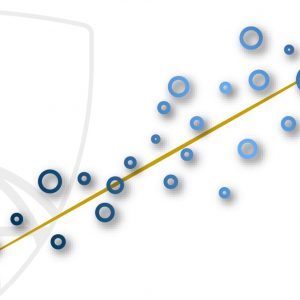
In this first part of a two part course, we’ll walk through the basics of statistical thinking – starting with an interesting question. Then, we’ll learn the correct statistical tool to help answer our question of interest – using R and hands–on Labs. Finally, we’ll learn how to interpret our findings and develop a meaningful conclusion. This course will consist of: Instructional videos for statistical concepts broken down into manageable topics Guided questions to help your understanding of the topic Weekly tutorial videos for using R Scaffolded learning with Pre–Labs (using R), followed by Labs where we will answer specific questions using real–world datasets Weekly wrap–up questions challenging both topic and application knowledge We will cover basic Descriptive Statistics – learning about visualizing and summarizing data, followed by a “Modeling” investigation where we’ll learn about linear, exponential, and logistic functions. We will learn how to interpret and use those functions with basic Pre–Calculus. These two “units” will set the learner up nicely for the second part of the course: Inferential Statistics with a multiple regression cap. Both parts of the course are intended to cover the same material as a typical introductory undergraduate statistics course, with an added twist of modeling. This …
Instructor Details
Courses : 1
Specification: Foundations of Data Analysis – Part 1
|
3 reviews for Foundations of Data Analysis – Part 1
Add a review Cancel reply
This site uses Akismet to reduce spam. Learn how your comment data is processed.
| Price | Free |
|---|---|
| Provider | |
| Duration | 27 hours |
| Year | 2020 |
| Level | Beginner |
| Language | English |
| Certificate | Yes |
| Quizzes | No |
FREE






Anonymous –
I completed this course under the Audit track, even though I didn’t bother with a certificate.
This is an excellent course. It teaches not only statistics in a clear, easily understood manner, but also cultivates in the student a structured and methodical way to tackle statistical research questions.
The lecture videos and R tutorial videos are well presented and delivered. You can also download PDF transcripts of the R tutorials, which is handy for copying the commands into RStudio.
I like especially the Pre Lab and Lab exercises. R scripts are provided for the Pre Labs, though you have to adapt these to do the Labs and later on the problem sets.
The teaching staff have obviously put a lot of thought into designing the Pre Labs and Lab exercises. Each one clearly states the primary research questions to be answered statistically. You are then guided to do initial exploration to understand the available data first, then reflect on why a particular test is the appropriate tool to be used.
You are also taught how to break down the analysis into logical steps subsetting the data, checking that the assumptions required by a test is met, getting a better feel of the data by visualisation etc. before actually carrying out the analysis in R and interpret the results.
I like especially the way they made available (after the questions are completed) videos feedback on Pre Lab questions, so you can learn why and where you made errors. A pity though that the same is not available for the Lab exercises and the problem sets.
The Lab conclusions are canned paragraphs where you have to fill in the gaps. The course doesn’t explicitly teach how to write reports, but you can learn from these canned paragraphs how to write succinct but comprehensive conclusions.
The course reading materials seem to be extracts from some open source text. They complement the lecture videos well .
The problem sets are good for testing comprehension, though I found that it is very easy to make careless mistakes and lose mark. I suppose it is a way for the course team to teach students to read the questions carefully.
For example, it won’t do to just copy the R output into the answer box when the question asked for an answer in percentage format, but without the percentage sign.
Overall, I thoroughly enjoyed the course and glad that I invested the time in doing it. So much so that I went on and also completed the follow up course, Foundations of Data Analysis Part 2.
I can highly recommend this course to anyone who wants to learn statistics, or R, or simply want clearer teaching if they struggle with other statistic course that they are doing.
Andrew Nakamura –
This course ended in Aug 2017. With that said, the prelab and lab units no longer function to provide answers to double check your understanding so what’s the point with continuing with the course. I was taking this due to the basic understanding that I’ll need some statistic background with R and Python as an aspiring data scientist. This course was highly recommended as the choice class to take as the top pick from Class Central.
Unfortunately, someone forgot to tell them that this course is not worth the value without the videos. I’m sure it was a great course, but with all that time and effort, I guess its no longer worth it to maintain courses that can’t provide a university with monetary value.
Charlie Soliman –
This course is a great start to learn both statistics and the basics of R. There are different types of material for different types of learners (course videos, downloadable reading material, tutorial videos) although it is better to use them all while learning as they complement each other. If you are a beginner, I do not recommend flying through the course. Spend the time and effort to read and re read the material before attempting the assignments. I found it more profitable when I made sure I had understood all details of the material. Otherwise, the assignments became more challenging then necessary.
You do not need to know R for this course and the course instructors offer the code for the assignments, although you do not have to use it if you prefer to learn R on your own. Having the code available was a good double check for me to make sure I had written the correct code as I was learning to apply R. Admittedly, most of what I learned in R here was based on the effort I put into learning it, as the course does not provide in depth tutorials for it. Rather you get the basics that will get you through the assignments. I might have completed the course faster (10 hrs/wk) but I preferred to invest the time learning R as I went along with the course. It was worth the effort.